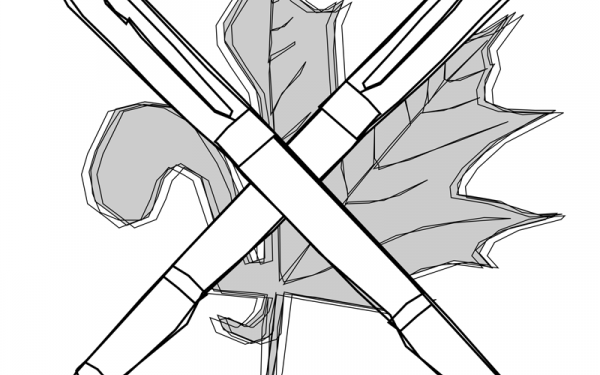Indigenous Righters
Three Native Writers Address Wrongs, Language, Genre in Friday Night Reading
Three Native writers—Louise B. Halfe, Daniel David Moses and Kateri Akiwenzie-Damm—graced Concordia with their presence and words Friday night as part of Creative Process and Performance in Indigenous Writing, a string of multi-faculty events to promote awareness of indigenous writing in Montreal.
Université de Montréal, McGill and Concordia put on the event together, which was preceded by a panel discussion at UdeM Friday afternoon and followed by a writing workshop at Atwater Library Saturday afternoon.
The evening featured a good mix of literary genres—between the three writers the audience was treated to poetry, fiction and drama—not to mention more than a handful of stories from the writers’ lives that were often just as enjoyable.
Moses kicked things off with an interesting decision, choosing to read a series of unpublished poems. The first of these, “A Small Essay on the Largeness of Light,” neatly encapsulated the genre smorgasbord on display during the evening, as he noted that, though his poetry had consistently found its way into his plays, this was perhaps the first time he had written a poem influenced by his playwright self.
Another poem Moses read, “My Discovery of America,” dealt obliquely with his homosexuality in the context of his job as a page in the Ontario Provincial Legislature as a youth. He capped off his reading with a spirited rendition of a dramatic monologue from his 2008 play Kyotopolis, reading as an 11-year-old Native pop star named Babe Fisher.
Next up was Louise B. Halfe, a Cree poet who provided a nice contrast to Moses’ all-English work by peppering her poems and her addresses to the audience with Cree words, phrases and names.
“English cannot in many instances capture the true essence of a Cree translation,” said Halfe regarding her linguistic juggling act.
“I generally decide how much I want to share and give away to the general public to strike a balance. It’s a conscious, deliberate, judicious choice.”
Halfe read segments from her three volumes of poetry, 1994’s Bear Bones & Feathers, 1998’s Blue Marrow, and her most recent, 2007’s The Crooked Good. It was this last one that made up the bulk of her time at the podium. Written in the form of an epic poem that re-constructs the Christian creation myth from a Native perspective, Halfe noted that the work attempts to discover “how all peoples come to terms with their mixed identities and their effects on children and personal selves.”
Reading last was Kateri Akiwenzie-Damm, who was introduced as an activist, writer, and journalist, among others. Akiwenzie-Damm led off her reading with a series of very rhythmic, song-like poems, including one she read off the lyric sheet of one of her CDs. Her final two pieces, however—a poem entitled “The Feast,” and “Mirrors,” a short story—were the real highlights of her reading.
“The Feast” is a short but evocative piece, a sexual feast that uses traditional indigenous foodstuffs to describe the female body. The real treat was hearing Akiwenzie-Damm discuss the poem afterward—particularly its use of the word “cunt.” She recalled encountering resistance to the word when a recording of the poem was to be broadcast on CBC, and later on, when a “de-cunted” version was objected by another broadcaster because of a line that alluded to the consumption of maple syrup in a sexually suggestive fashion.
Akiwenzie-Damm admitted th-at while such censorship could be “frustrating at times—and beyond that enraging,” she understands that her “efforts to reclaim the word ‘cunt’ may not be a conversation that should necessarily include a mainstream audience that might […] include children.”
Nevertheless, the poem sprang from her desire to write “a beautiful and erotic poem that included the word cunt in an attempt to recontextualize it and remind people that the female form is beautiful and that procreation and our reproductive organs are beautiful, and that love is beautiful.”
“Mirrors,” for its part, tells the story of Thomas Kendasswin, a father who struggles to reconcile his roles as a single-parent and single man, as he finds himself trying to cover up evidence of a one-night stand from his two children one morning.
Though the story avoided some of the political aspects present in her other work and in Moses’ and Halfe’s work, Akiwenzie-Damm felt there was still a political thread to the story.
“For Indigenous writers to write stories about love and family and heartbreak and the daily struggles we face as human beings,” she pointed out, “can most certainly be political.” In “Mirrors,” she strove to confront “the stereotypes and misconceptions and lies about who [native people] are—the lies and stereotypes that surround us and that many can’t see past,” but by doing it in “an indirect way.”
As she accurately noted, “It’s often subtle but, when done well, very effective.”
This article originally appeared in Volume 31, Issue 08, published October 5, 2010.

__900_688_90.jpg)
__900_656_90.jpg)
__887_700_90.jpg)





_600_375_90_s_c1.jpg)